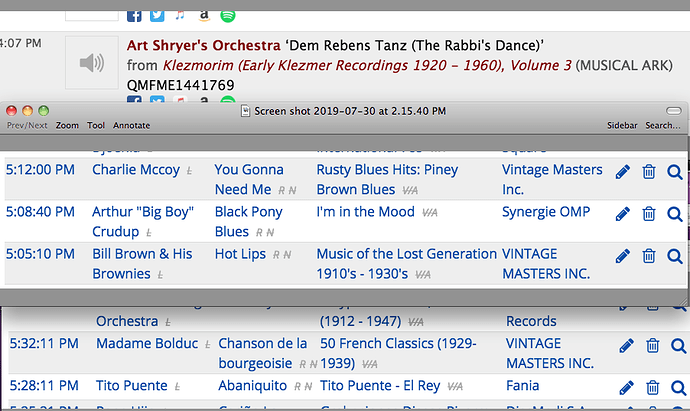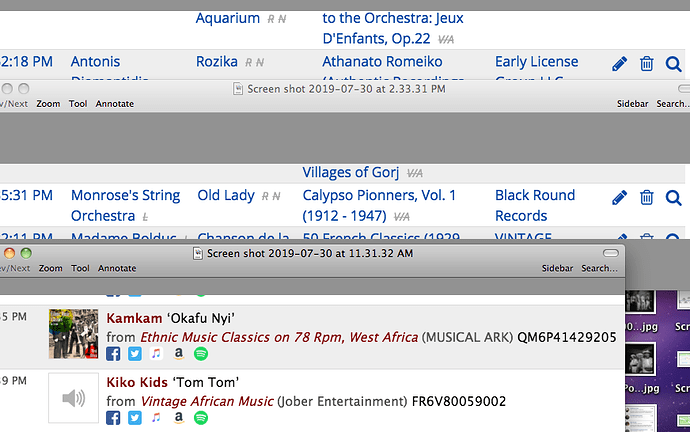Below is an email to spinitron tech support - identifying a consistent bias in spinitron’s automated playlists - favoring bootleg/pirate/plagirized reissues at the expense of legitimate reissues - posted here so “everyone can benefit”
==============
Hi Spinitron People
station: KPOO
username: McSchmormac (KPOO)
I’m not sure who to address this to, I’ve been using the automated playlist generator of spinitron for a few months, and I have issues of concern about the automatically generated content - there is something of a pattern I’ve been observing, whereby a release is mis-identified one of its own rip offs.
Here are four examples:
- When I play tracks from “Anthology of American Folk edited by Harry Smith” by Smithsonian Folkways
Spinitron, EVERY TIME, identifies these as being from a pirated knock-off version of this set on DOXY records called “Harry Smith’s Complete Anthology of American Folk Music”
- they have taken the entire Folkways set, maintained the original sequence, duplicated the Folkways masters, which were restored and considerable expense and re-packaged them for re-sale to an unsuspecting public
You can read further about DOXY here:
and here:
The consensus among music lovers and collectors seems to be that DOXY is a shabby rip-off label best avoided.
- I have played numerous selections from “Opika Pende - Africa at 78RPM” on the Dust-to-Digital label - a grammy-nominated collection of never-before released on CD African recordings from the private collection of one person: https://latimesblogs.latimes.com/music_blog/2011/12/opika-pende-africa-at-78-rpm-resurrects-a-continents-music.html
Every time, spinitron identifies tracks from a more recent multi-volume collection of African 78RPM recordings taken directly from Opika Pende - called “Originated In Africa” on Count Records
- There is grammy-nominated a 4cd set of SouthEast Asian 78RPM recordings on Dust-to-Digital "Longing For The Past - The 78rpm Era in SOuthEast Asia"https://ethnomusicologyreview.ucla.edu/content/review-longing-past-78-rpm-era-southeast-asia
Again, this is a set of rare gramophone recordings never-before released on CD,
but, whenever I play trcks from this set, Spinitron automatically recrords as these as coming from this knock-off multi-volume set: “Forgotten SOunds of Southeast Asia” again on COUNT records
- “Greek Rhapsody” on Dust-to-Digital https://www.dust-digital.com/greek/
a collection of Greek instrumental records from the 78rpm era
On several occasions when I play selections from this release - they are mis-identified by spinitron as being from a derivative pirate release called “Greek Instrumental” on COunt Records
Besides Doxy, Count, Round, Hellencic - there are numerous labels who are unscrupulously pirating re-issues produced by other labels - sometimes duplicating with sub-standard quality - they re making their pirte releases on all the streaming platforms.
I am concerned that by automatically listing them on spinitron, spinitron is doing a disservice to music lovers, and record collectors, and labels who put so much care into presenting these almost-forgotten recordings to a new audience. Unless I manually correct the spinitron entires for my program, I am perpetuating this proliferation of bad information, and helping pertuate the enrichment of pirates and bootleggers at the expense of labels like Smithsonian Folkways and Dust To Digital who do such valuable work preserving recorded history.
Is there anything spintron can do to adjust their algorithms so the sketchy overseas labels are not being prioritized over the highly respected American labels?

